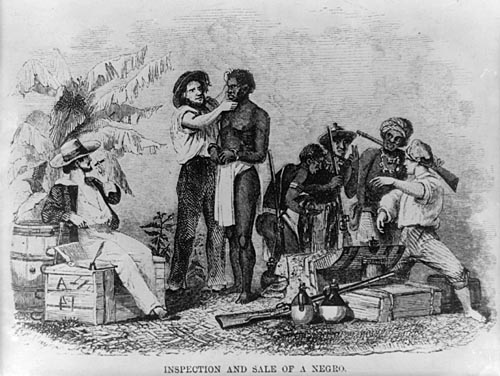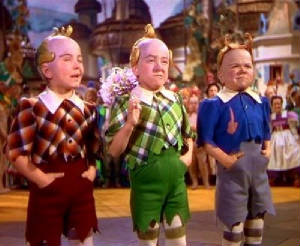|
|
 |
|
Leave Blog Feedback! View Blog Feedback!
|
 |
|
|
Tuesday, June 21, 2011
Purity in The Impure

Everything is pure to those whose hearts are pure. - Titus 1:15
There
are some things in this world that are, inarguably, unequivocally, undeniably wrong. It doesn't matter if you're a Christian,
belong to another religion, or assume that God is a fairy tale; regardless of our spiritual or moral compasses, we can
all know when something is flat out bad.
Murder, for example. Or rape. Or child molestation. Or taking the last
piece of pizza without feigning concern that the others you're eating with will have none. Or taking your flock of children
to the movie theater and allowing them to kick the seats in front of them, vocally interact with the film, and generally ruin
the movie-going experience for the other patrons around them. All of these things are wrong, and everyone - no matter what
culture or society - knows it.
Also, there's slavery.
I have to admit that I've long been bothered by
the bible's so-called 'stance' on slavery. After all, any thinking, reasonable human being knows that when we subject
others to the point that they are thought of as property and not people, we're committing an atrocity against our fellow
man. We know that it's wrong, and that despite its appearance in cultures throughout world history, that it's never been an
acceptable practice.
So, here we have God. And if the bible is to believed, He loves us - so much, in fact, that
He came in the form of a human being to show us the way we should treat one another and make it possible for us to spend an
eternity in blissful happiness. Yet, the way God's word treats slavery is offhanded at best, and at worst, seemingly completely tolerant. It's mentioned as a fact of life, and even when it's dealt with by Jesus Himself, it's used as a teaching device or a metaphor.
To be frank, this bugs me to no end. Why don't God's people take a stand? Why doesn't God say, 'and oh by the
way, slavery is wrong'? And Jesus is the worst - He says, 'love your neighbors,' but then compares his His followers to subjects
in the world's most heinous system as if He's discussing union workers at Best Buy. Even if His mission is larger than government
reform (which, as our own bloody history taught us, is what's necessary to abolish slavery in a nation), a comment or two
couldn't have hurt, could it? Oh, sure - on an intellectual, textbook answer level, explain that slavery was simply an accepted
part of the culture Jesus was born into, and that there was nothing inflammatory about acknowledging its existence and using
it to connect with His audience. But still; something about the whole thing doesn't sit well with me, especially considering
Jesus' own life teaches me to treat ALL people with compassion, mercy, and equality.
It was with this frame of
mind that I opened my bible to the tiny book of Titus recently, and it was with this attitude that I came across yet another
flippant mention of slavery. And yet, this time it was different; the apostle Paul's words reflect something amazing:
Slaves must always obey their masters and do their best to please them. They must not talk back or steal, but must show
themselves to be entirely trustworthy and good. Then they will make the teaching about God our Savior attractive in every
way. - Titus 2:9-10
At first, I was taken aback by the almost abusive way Paul treats the slaves. To tell
someone who's treated as a coffee table or a tool belt that they should 'do their best to please' their masters sounds a lot
like telling an abused woman to go home and do a better job of pleasing her husband so that next time, the beating isn't so
harsh. Upon a second look, however, the truth is actually beautiful:
These early Christian slaves had a commitment
to Christ that I've never seen in my life.
I cannot fathom how much these people would have loved God to be willing
to stick it out in the cruelest of circumstances to advance His kingdom. And more stunningly, I cannot imagine how much love
these people had in their hearts to desire their masters to have a saving relationship with God. They didn't want self-preservation
or even basic human rights more than they wanted others to know Jesus. That's amazing and incredible; that's grace that defies
logic; that's love that goes beyond expectations. That's an attitude and a heart that I hope and pray that one day I can exhibit
in the world around me.
And that's precisely what Jesus was all about.
I'm still bothered by the bible's
treatment of slavery, but I'm humble enough to admit that my sensibilities didn't need to be taken into consideration by Jesus
or the other biblical writers. And I'm sure that there are things in our culture and society that would horrify Peter, James
and Paul.
But at the end of the day, I'm comforted by the idea that to those whose hearts are pure, everything
can be pure. God can use any situation - even those that are so awful that no one understands why they exist at all - and
make something beautiful out of it. After all, that's what He's done in my life.
And without Him, I would be anything
but pure of heart.
Tuesday, June 14, 2011
Disneyland, Munchkins... and Christians?

Quick word association game: when I say the words, 'the friendliest people on earth,' what do you think
of? If you're like me, you may think of the employees at Disneyland. After all, Disneyland is the
friendliest place on earth, and I'm 80% sure if any of the employees so much as frown, they have to immediately turn in their
Mickey ears. If you're like my wife, perhaps you think of the Munchkins from The Wizard of Oz, who, you'll recall,
were so stoked to be rid of the Wicked Witch of the East that they had a choreographed song and dance to commemorate the occasion.
Or, if you're thinking ironically and going for a laugh, maybe you'll answer with 'the greeters at Wal-Mart,' knowing full
well that while they're supposed to greet you with a smile and a 'Welcome to Wal-Mart!' that, nine times out of then, they're
either, a.) Half asleep; b.) Only willing to grunt in your general
direction; or c.) Both half asleep and only willilng to grunt in your general direction. Maybe you think of your grandmother or an airline stewardess, a rent-a-clown or your waitress during TGI Friday's
happy hour. Regardless, how far down the list do you have to get until you think, 'American church-goer'? Number 273? Number
864? Do you get there at all? I ask because I happened to be talking to my mom (who, for the record,
is almost always friendly) about an experience she had recently at a small town Christian church in America's Bible Belt.
She was visiting for her granddaughter's Vacation Bible School closing ceremony, and she spent more than 90 minutes surrounded
by well over 100 people watching the proceedings. There were smiling children; there was a meal; there was a missionary promoting
his cause, asking for support. She sat in a pew, ate a meal, gave to the mission, and pleasantly sat smiling in a crowded
room of Christians. And yet, despite her pleasant disposition, not one person came over to say
hello. No one shook her hand; no one introduced themselves; no one asked what her name was or what she was doing there. It
was as if she were invisible or, worse, completely visible and yet horrifyingly repulsive. In fact, the only time anyone seemed
to acknowledge that she was alive was when was announced that she needed to move her car... ...
from its legal parking spot... ... so that the gardener could get the weed wacker close to the
curb. Seriously. Because my mom is a Christian woman (and, perhaps,
out of appreciation of real human contact), she resisted the urge to tell the gardener what she could do with her weed wacker,
but she left that day completely disheartened with the way we Christians treat those we don't know. And I can't say I blame
her; in my own experience, the behavior of most Christians makes the semi-comatose Wal-Mart greeters look like candidates
to be Employees of the Month at Disneyland. Jesus wasn't kidding when He said that the world would know we belong to Him when we love one another, but at this point, I'm pretty sure we'd be doing
well to settle for a smile and a warm and friendly 'hi.' The truth is, if we really believe what we claim to believe (that
Jesus is the only way, truth and life for the world around us to hope in), then it will do us well to interact with others
with a little more self-awareness. And while I can admit that I'm certainly guilty of being cranky and unfriendly from time
to time, it also seems apparent that it's high time we realized that the days of Christians being jerks and influencing the
world around us are, officially, over. No one likes being treated like dirt, and in this day and age, the societal pressures
to go to church are all but gone. If we're going to show people that Jesus has made a difference
in our lives, we may not get many chances. And if that's really our goal, then it may be a good
idea to make sure Jesus really has made a difference in the first place. And if not? I hear Wal-Mart
is always hiring.
Thursday, June 9, 2011
Opening Our Eyes

I don't want to be Esther. Now, that may sound like an obvious point. After all, I don't know very many males who
would trade their cushy existences for a chance to live the monthly craziness and promise of one day squeezing a watermelon
out of a garden hose that every woman has to deal with. And while Esther was certainly used by God in a powerful way, to be
perfectly frank, that's all well and good, but if it takes living in an occupied nation, being taken from your home, and having
to sexually satisfy a sleazebag of a dictator to be a part of God's plans, then count me out. But that's not what I'm talking
about. Instead, I don't want to be in my world what Esther was in hers: A blind fool. In case you weren't around for last month's sermon series on the book of Esther, here's a quick recap of what happened:
Xerxes, the ruler of Persia, was angry with his wife, and sought to replace her. Through an unscrupulous process that wasn't
unlike The Bachelor, a beautiful young Jewish girl named Esther took the throne. Meanwhile, Esther's adoptive father
was a man named Mordecai, and through a series of seemingly unrelated events, found himself between a rock and a hard place
when it came to the Prime Minister of the land, a man named Haman. Long story short, Mordecai's refusal to bow to the man
caused a royal decree that would wipe out the entire Nation of Israel. In other words, it was
a bad day to be a Hebrew. Predictably, the Jewish people mourned. And it was around this time
that Esther heard the news that Mordecai was upset. She sent a messenger, in the words of the biblical writer, to, 'go to Mordecai and find out what was troubling him and why he was in mourning.' (Esther
4:5) Now, understand - this was the man that raised Esther. And Esther, as queen of Persia,
was allowed to do anything she wanted with her time. And the Jewish people were mourning over a national decree endorsed by
her husband. With all these details in place, only one question needs to be asked: HOW IN THE
WORLD DID ESTHER NOT KNOW WHAT WAS GOING ON!? The truth is, Esther was insulated away from the
world so much that when something of national importance happened that threatened to destroy her loved ones, she wasn't even
aware it was happening. Too often, you and I are like Esther. Sequestered away from the 'sinful
world,' obsessed with out Christian subculture, we aren't plugged in enough to even know what's important to the people around
us. We assume our concerns are theirs, and are surprised when we try to engage a culture that doesn't quite track with the
things we care about. As a result, at the end of the day, we may be trying to 'let our light shine' for Jesus and His kingdom,
but we have no idea where we need to be or how we need to go about doing it. I don't want to be
Esther. The other night, I slept through an earthquake in Missouri, and it got me thinking: how many spiritual earthquakes have I slept through? Too many to count, I'm sure. But while
I can't do anything about the past, I can certainly change today and allow that change to spill over into my tomorrow. If
you and I don't want to be like Esther, then there's only one thing we can do: Wake up.
|
|
|
 |
|
|
 |
|
|
 |
|
|
|
|
|
|
 |

